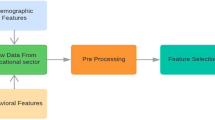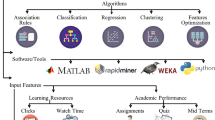Abstract
Various scenarios to improve the education system have been carried out. One of them is the application of educational data mining to gain the student’s academic achievement, also decreasing the risk of drop out. The data was collected from three private universities in Jakarta, where it consists of academic, social, and economic information, as the demographics of 350 students with 23 attributes. Educational Data Mining applied a WEKA’s tool that takes a rule in this study, while the classification phases applied PART, BayesNet, Random Tree, and J48 as their methods of classification. Attributes that have a significant influence on the classification process are selected as a medium of classification. The end of this study explained that Random Tree plays a significant part in classifying all possibilities related to predicting students’ academic performance. The accuracy level is relatively high, and the misclassification rate is also low. Besides, the Apriori algorithm also plays a significant role in finding association rules of educational data mining of all the best attributes and rules available.
Access this chapter
Tax calculation will be finalised at checkout
Purchases are for personal use only
Similar content being viewed by others
References
Fang Y, et al (2017) Online learning persistence and academic achievement. Int Educ Data Min Soc
Ahuja R, Jha A, Maurya R, Srivastava R (2019) Analysis of educational data mining. In: Harmony search and nature inspired optimization algorithms. Springer, Singapore pp 897–907
Baker RS (2019) Challenges for the future of educational data mining: the baker learning analytics prizes. JEDM, J Educ Data Min 11(1):1–17
Mitrofanova YS, Anna AS, Olga AF (2019) Modeling smart learning processes based on educational data mining tools. In: Smart education and e-learning 2019. Springer, Singapore pp 561–571
Asif R, Merceron A, Ali SA, Haider NG (2017) Analyzing undergraduate students’ performance using educational data mining. Comput Educ 113:177–194
Triayudi A, Sumiati S, Dwiyatno S, Karyaningsih D, Susilawati S (2021) Measure the effectiveness of information systems with the naïve bayes classifier method. IAES Int J Artif Intell 10(2)
Silva C, Fonseca J (2017) Educational data mining: a literature review. In: Europe and MENA cooperation advances in information and communication technologies. Springer, Cham pp 87–94
Hung HC, Liu IF, Liang CT, Su YS (2020) Applying educational data mining to explore students’ learning patterns in the flipped learning approach for coding education. Symmetry 12(2):213
Kumar AD, Selvam RP, Kumar KS (2018) Review on prediction algorithms in educational data mining. Int J Pure Appl Math 118(8):531–537
Salloum SA, Alshurideh M, Elnagar A, Shaalan K (2020) Mining in educational data: review and future directions. In: AICV pp 92–102
Heath MK (2021) Buried treasure or Ill-gotten spoils: the ethics of data mining and learning analytics in online instruction. Educ Tech Res Dev 69(1):331–334
Sánchez-Sordo JM (2019) Data mining techniques for the study of online learning from an extended approach. Multi J Educ, Soc Technol Sci 6(1): 1–24
Agung T, Widyarto OW, Vidila R (2020) CLG clustering for mapping pattern analysis of student academic achievement. ICIC Express Letters 14(12):1225–1234
Devasia T, Vinushree TP, Hegde V (2016) Prediction of students performance using educational data mining. In: 2016 international conference on data mining and advanced computing (SAPIENCE). IEEE pp 91–95
Njeru AM, et al (2017) Using IoT technology to improve online education through data mining. 2017 international conference on applied system innovation (ICASI). IEEE
Gan G, Ng MKP (2017) K-means clustering with outlier removal. Pattern Recogn Lett 90:8–14
Kimmons R, Veletsianos G (2018) Public internet data mining methods in instructional design, educational technology, and online learning research. TechTrends 62(5):492–500
Jie W, et al (2017) Application of educational data mining on analysis of students’ online learning behavior. 2017 2nd international conference on image, vision and computing (ICIVC). IEEE
Wang R (2021) Exploration of data mining algorithms of an online learning behaviour log based on cloud computing. Int J Continuing Eng Educ Life Long Learn 31(3):371–380
Islam O, Siddiqui M, Aljohani NR (2019) Identifying online profiles of distance learning students using data mining techniques. In: Proceedings of the 2019 the 3rd international conference on digital technology in education, pp 115–120
Gonçalves AFD, Maciel AMA, Rodrigues RL (2017) Development of a data mining education framework for data visualization in distance learning environments. In: International conference on software engineering and knowledge engineering
Xu Y, Zhang M, Gao Z (2019) The construction of distance education personalized learning platform based on educational data mining. In: International conference on applications and techniques in cyber security and intelligence. Springer, Cham pp 1076–1085
Ferraz RRN, da Silva MVC, da Silva RA, Quoniam L (2019) Implementation of a distance learning program focused on continuing medical education with the support of patent-based data mining. Revista de Gestão
Rong L (2021) Remote case teaching mode based on computer FPGA platform and data mining. Microprocess Microsyst 83:103986
Qi Z (2018) Personalized distance education system based on data mining. Int J Emerg Technol Learn 13(7)
Author information
Authors and Affiliations
Corresponding author
Editor information
Editors and Affiliations
Rights and permissions
Copyright information
© 2022 The Author(s), under exclusive license to Springer Nature Singapore Pte Ltd.
About this paper
Cite this paper
Triayudi, A., Widyarto, W.O., Rosalina, V. (2022). Analysis of Educational Data Mining Using WEKA for the Performance Students Achievements. In: Triwiyanto, T., Rizal, A., Caesarendra, W. (eds) Proceedings of the 2nd International Conference on Electronics, Biomedical Engineering, and Health Informatics. Lecture Notes in Electrical Engineering, vol 898. Springer, Singapore. https://doi.org/10.1007/978-981-19-1804-9_1
Download citation
DOI: https://doi.org/10.1007/978-981-19-1804-9_1
Published:
Publisher Name: Springer, Singapore
Print ISBN: 978-981-19-1803-2
Online ISBN: 978-981-19-1804-9
eBook Packages: EngineeringEngineering (R0)




